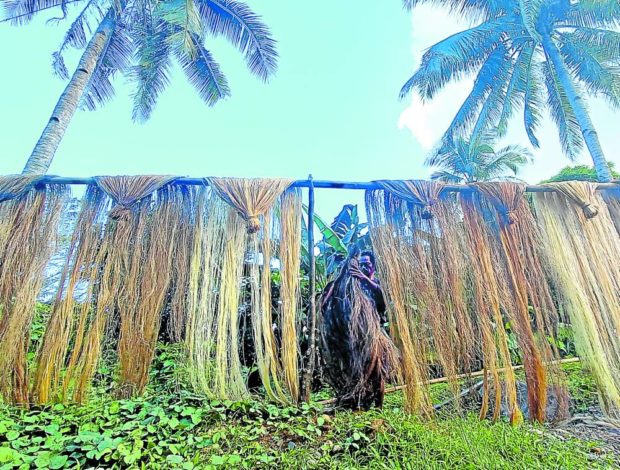
AIR DRY | Strips of abaca fibers are air dried by a farmer in Baras town in Catanduanes, in this photo taken Oct. 24, 2022, before these are sold to the market. The province’s abaca industry, which involves around 14,000 farmers, is now being threatened by the decision of the Bangko Sentral ng Pilipinas to do away with paper banknotes and use polymer in producing peso bills. (File photo MICHAEL B. JAUCIAN / Inquirer Southern Luzon)
LIGAO CITY, Albay, Philippines — Rep. Jose Bong Teves Jr. of Talino at Galing ng Pinoy (TGP Partylist) has urged the Bangko Central ng Pilipinas (BSP) to rethink replacing abaca (manila hemp) with polymer in making peso bills as it has a negative effect on the local abaca industry.
The Bicol region, a top producer of abaca fiber, would be the worst affected by the decision of the BSP to replace paper bills with polymer or plastic-made banknotes, industry officials said.
In the province of Catanduanes alone, abaca farmers faced huge income losses if BSP will no longer fiber in making money, said Bert Lusuegro, provincial officer of the Philippine Fiber Industry Development Authority (Philfida).
“In a year, the (Catanduanes abaca farmers) are producing 100 metric tons (of abaca) and 30 percent of this goes to the making of peso bills as the raw material,” Lusuegro said in a phone interview on Feb. 8.
Catanduanes has around 14,000 abaca farmers. The abaca fibers produced in the province are regarded as first class material due to its durability, added Lusuegro.
Losing a major market for its product would be devastating to the province’s abaca industry as Catanduanes is still recovering from the devastation of Typhoon Rolly (international name: Goni) which struck the province in 2020, and is being assisted with a P60 million-rehabilitation program provided by the Department of Agriculture, said Lusuegro.
Mary Anne Molina, Philfida Bicol chief, said in a online interview on Sunday that there are 127, 226 abaca farmers in the country, 24,129 of whom are in Bicol.
According to Teves, abaca farmers from Davao del Norte and Caraga region were also worried about losses if paper banknotes are replaced by polymer.
“Since the polymer banknote, particularly the P1,000 paper bill, was introduced, the sale of abaca was affected, considering that the Philippine peso bill is made of 80 percent cotton and 20 percent fiber,” the lawmaker told Inquirer in a phone interview on Feb. 8.
How about us?
Abaca farmer Nardito Abines Ibatuan, 63, of Panique village in Caramoran town in Catanduanes, where the bulk of the country’s supply of abaca comes from, feared it would be tough times ahead for him and his fellow farmers.
“Our livelihood would surely be affected. I hope they (BSP) would not continue with that because what would happen to us? I’m still sending my kids to school. Where would I get enough money to raise them now that the price of abaca has gone down and now they plan to stop using it in producing paper bills,” Ibatuan said in a phone interview Friday.
He added: “Right now the price of abaca is P60 per kilo unlike before it was sold for P90 per kilo. We hope that the BSP would patronize our own products the abaca is stronger than that plastic material,” Ibatuan added.
Laughing stock
Teves believed the central bank should realize that the continued use of paper banknotes, while not as long-lasting as polymer, would be best for the country in the long run.
“What we want is to further strengthen our dollar reserve and abaca fiber brings in dollars to us as one of our exported products. Now, if we shift to buying plastic to make our money, just like what they did to [the] P1000 bill. We would have to import [plastic] and use our dollar [reserves to purchase] which would [negatively] affect our economy,” he stressed.
He said the Philippines could end up the laughing stock of other countries “since we are rich in abaca fiber but we don’t use it.”
“We already experienced the negative effect [of shifting to a different material from abaca] particularly in low sales and selling price of abaca when the BSP turned the P20 bill into coins with raw materials purchased from foreign counties,” he added.
Teves said he filed House Bill 567 urging the central bank to continue using abaca in banknotes last January. It’s now being reviewed by the House Committee on Finance.